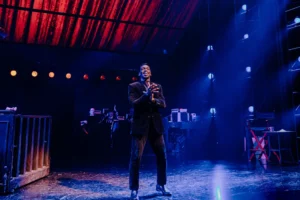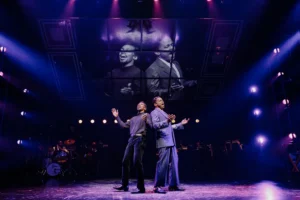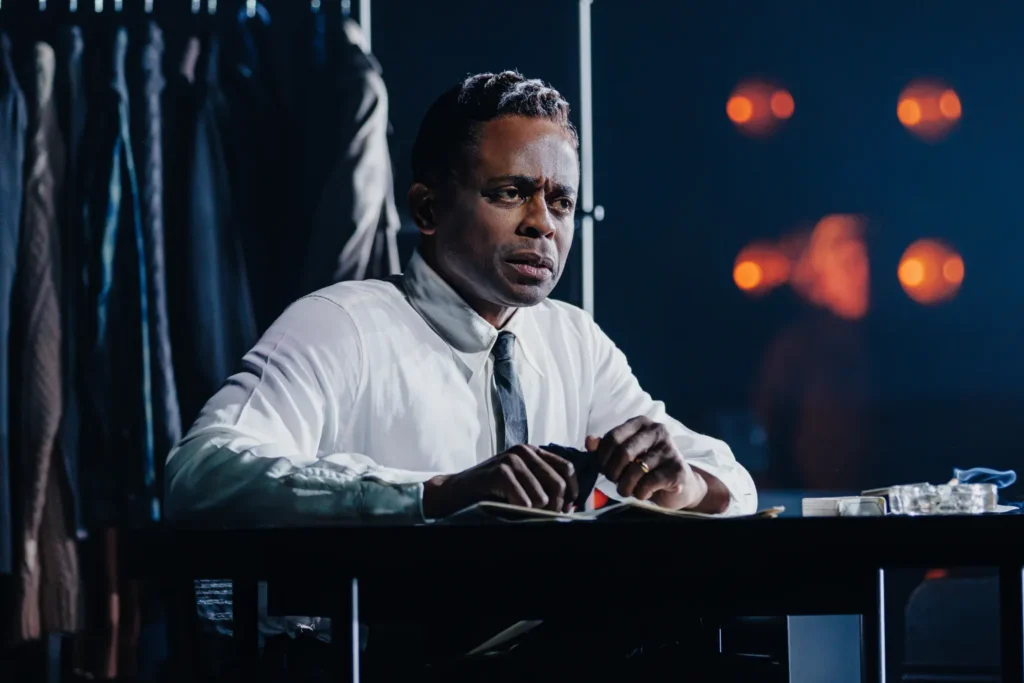A Life Lost in the Telling
BY CHRISTOPHER BYRNE
An extraordinary cast and spectacular musicianship are, sadly, not enough to rescue Lights Out, now at New York Theatre Workshop. The new musical by Colman Domingo and Patricia McGregor gets caught somewhere between a bio-musical about Nat “King” Cole and an examination of the dark history of racism in entertainment and the culture of the U.S. in the late 1950s.

First, as noted, what works are the performances. Dulé Hill is brilliant as Cole. He has the familiar, warm voice down perfectly, moves with grace and, in a masterful tap number with Daniel J. Watts who plays Sammy Davis Jr., is a consummate performer. Watts, as Davis, is scripted to be a gadfly, a kind of manic counterpoint to Hill’s Cole, and lights up the stage with charm and talent whenever he there—which is often. Ruby Lewis who plays Betty Hutton and Peggy Lee channels both, very distinct performers. Krystal Joy Brown plays both Eartha Kitt and Natalie Cole and captures their unique styles beautifully. When any of these performers are singing, their artistry, versatility, and skill light up the stage, and with the big band arrangements of well-known songs by John McDaniel—and a wonderful, onstage band playing the iconic Nelson Riddle and his orchestra—the effect is sublime.
The problems are with the piece itself and its confusing structure. It opens with Cole in his dressing room on the night of the final taping of his TV show in 1957. The show has been cancelled because the producers have failed to secure a national sponsor, and the implication is that no company wants to support a black performer. In the Funny Girl trope, Cole is staring into the mirror wondering how he got here. Davis shows up and, it seems, is encouraging Cole to be more proactive in fighting against discrimination and tells the audience, which he addresses regularly, that what they are about to see is a “fever dream.”

Such dreams are usually chaotic, and the rest of the show is as well. In fact, it becomes nearly impossible to tell what is real—i.e. the filming of the show—and what is the dream—what’s going on in Cole’s imagination. The effect is haphazard. There are moments when they are ostensibly taping crashing into fantasies, and the result is confusing. Stage managers and producers seem to be enforcing what today we would consider racist broadcast rules, such as maintaining a specific distance between performers of different races. At one point, it seems as if the show is going to be saved by national sponsor, but that turns out to be another fantasy of a cigarette brand crudely marketed to the Black audience. There are some actual, historic, elements such as using makeup to “whiten” black performers during this time, ostensibly to be less threatening to a white audience. Through all of this, Cole is consistently, even aggressively, encouraged by Davis to be more aggressive, to speak up more vocally for black rights and demand respect. At times, it appears that Cole is being criticized for not using his celebrity to do more to push back against the racist structures.
The script is certainly to blame for this confusion, but Patricia McGregor’s muddy direction doesn’t help matters. Time, place, reality, fantasy are all jumbled together, and it’s both frustrating to watch and blunts the dramatic impact of the piece.
The show as a piece of biography is a disservice to Cole who spent his life as a quiet but persistent activist and whose refusal to accept racist rules for Black performers played a huge role in overcoming those limits. He was the first Black man to buy a house in Los Angeles’ Hancock Park neighborhood, even though he was subjected to attacks for doing so. When he played in Las Vegas, he effectively integrated the famous Sands Hotel, refusing to play unless he and his band were accommodated. Throughout his career, he used contracts and lawsuits to challenge segregation—and won—transforming the world for the Black performers who would follow him. Even his TV show was groundbreaking. Putting him front and center on NBC showed that a Black man could be more than a supporting player, relegated to the racial stereotypes that had previously been common. To be fair, that is alluded to in the script, but it’s largely a point made in passing.
Of course, a more accurate, or even linear, biography of Cole is not the show that Domingo and McGregor chose to create. Nonetheless, they get trapped in their trope and end up stumbling over themselves trying to make points that others have made more artfully and with more humanity. The movie Green Book comes to mind as just one example.
Cole died in 1965, just eight years after the events of Lights Out. His legacy, like his music, lives on. That’s a fuller story that’s still waiting to be told.
Lights Out
New York Theatre Workshop
79 East 4th Street, Manhattan
Tues-Sat 7 p.m.; Sat, Sun 2 p.m. through June 29
Tickets from $59 at NYTW
Featured Image: Dulé Hill as Nat King Cole
Photographs © Marc J. Franklin from New York
Published May 27, 2025









More Stories
Broadway Review: Art
Fall Arts Preview: Emus, Foxes and Eric Clapton, Too
Diane DiMassa Book Event September 25